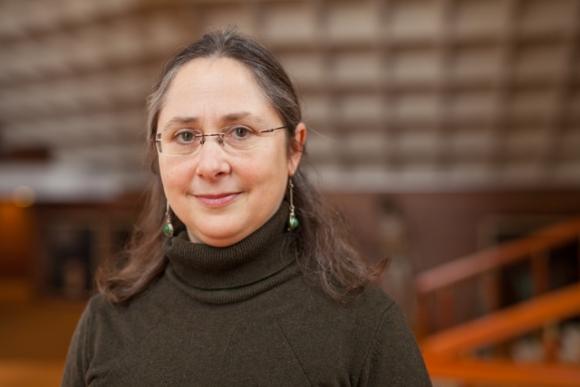de fnt.ro

Maria Bonanigo is a choreographer and composer, but she also danced and acted in numerous shows. She has been collaborating with director Daniele Finzi Pasca for the past 30 years; together, they started the Finzi Pasca Theatre Company, alongside three more colleagues, in 2011. They have been invited to join the NTF with “Donka- a letter to Chekhov”, which was performed last night and the night before and the National Theatre of Bucharest.
31 October 2014, Articles
Maria Bonanigo is a choreographer and composer, but she also danced and acted in numerous shows. She has been collaborating with director Daniele Finzi Pasca for the past 30 years; together, they started the Finzi Pasca Theatre Company, alongside three more colleagues, in 2011. They have been invited to join the NTF with “Donka- a letter to Chekhov”, which was performed last night and the night before and the National Theatre of Bucharest.
An interview by Adina Scorțescu
On the dark stage of the Studio Hall, Maria rehearses with a young, long-haired actress. She doesn’t say a thing to her, she just hops like a tired hare and emits visceral, rhythmic sounds- part of the music in the show, which she composed herself. She then smiles. When you ask what makes the theatre company she founded different than the others, the same words comes up again and again: “empathy”.
You compose, create choreography, dance, act. Is there anything you can’t do in theatre?
(laughs) I no longer dance… And there are a great many things in theatre which I don’t know how to do, aerial acrobatics for instance. But I am glad to work with those who can, there are many very talented people in the troupe.
Alongside Daniele Finzi Pasca you developed a theatrical technique you named “theatre of the soothing touch” . What does it imply, exactly?
It’s a way of working with the actors (with artists, in general actually), a vision of theatre through which we don’t mean to be aggressive. We sometimes transmit things which are hard, dramatic even, but we also take an interest in the light side of things, and especially the way the story is told. It’s about connecting with the actor, the dancer, the musician or the audience with empathy.
So, in your company, the rehearsals are more playful, with a lighter tone than in other companies?
Maybe. It’s a lot of work, we’re all tired by the end of it, so it’s not easy, but maybe even painful, for the acrobats. However, here, the way we work with one another( I’m not saying other companies don’t do this) is highly empathic. There is complicity, from the very beginning. And there is will ,from everybody, to maintain stability, to work as a team ,respecting the others and their vision. Each artist has their own vision, but there is a director who must- necessarily- transmit his own vision. Yet there are ways to work without crushing another’s vision with your own.
Same thing with the audience- we don’t just supply him with our vision and then let him deal with it. It’s just an opinion, one we don’t enforce.
You began working with director Daniele Finzi Pasca in 1984. How did it happen?
We were both very young. I was a dancer, choreographer and musical student. And my path as a dancer came close to theatre. He was a young director, from the same country. My composition teacher, who knew both of us, “hooked us up”. From the beginning, it was very clear that the two of us were going on the same path. Although I can’t say we always see eye to eye.
In a few words, what would be that path?
Firstly, the man. The work of the clown, an empathic character, is a very direct way of approaching an audience. They, the organic way of feeling music, dance, everything…reason is also there, but it’s not the most important thing; it only helps, should the need arise. But the things you discover, they come from somewhere else, a profound space, in which images are together, not sectioned off. It’s difficult to make this into a system.
But that’s what we’re trying to do, to have a method, one which we could apply over and over when we give the actor the necessary information, without underlining reason.
So you improvise a lot?
Nu, it’s not about improvisation. Sure, the competence of all the artists- actors, acrobats- gives us a lot of information. But, technically, we’re the ones who pass the instructions along. It’s just that the way we work is…like a soothing touch. Let me build a parallel : when making bread, you can weigh the flour, water, yeast and so on. Or you can measure them by eye and feel the dough. There’s a method here also, it’s got nothing to do with improvisation.
How was the idea behind “Donka” born?
The people from the Moscow Chekhov Festival asked Daniele to do Chekhov. Daniele as afraiad, he told them: “But I’m not specialised in Chekhov!”. They told him it’s not a problem, that he should do what he thinks would fit Chekhov. So we visited where he lived, we read his every work. We were fascinated by his diary! And that’s how we decided on the nexus of our show: the man should be the centre, not the writer or the doctor.
I, personally, sought the sounds in the life of Chekhov, I wanted to find out what he liked. We all sought and ended up loving the person he was. So the show is an homage to Chekhov. It’s “our Chekhov”, a letter to him.
How did the Russian audience react?
Splendidly! We were afraid because the premier was actually in Moscow, on the anniversary of 150 years since Chekhov’s birth (29th of January 1860). But the public was deeply moved. And that was wonderful for us.
Photo: Adi Bulboacă
